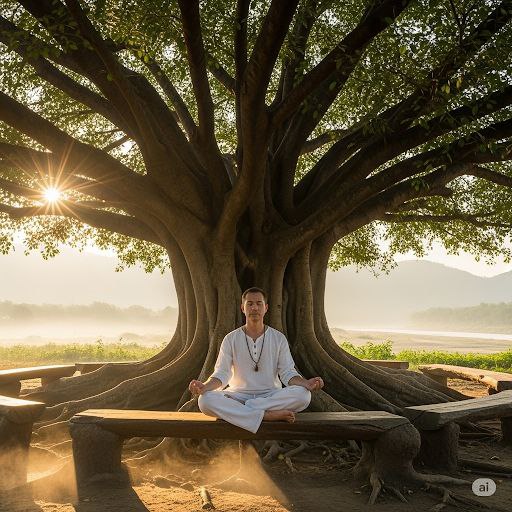Two Ways of Living Life: From Unconscious Doer to Conscious/Observer Doer
We all live life, but are we truly living it on our own terms? According to ancient Indian philosophy, there are two main ways of living: living as merely a doer and living as a conscious/observer doer. In these two approaches, the focal point of our consciousness shifts, and with that, the quality of our experiences, peace, and joy also changes.




When the Mind is Our Master: The Life of a Mere Doer
When we live as merely a doer, our mind controls us. In this state, the mind becomes our master. The nature of the mind is restless and full of countless desires. It constantly pushes us towards the external world, trapping us in a web of सुख (sukha - pleasure) and दुख (dukha - pain). We become excessively dependent on the outcomes of our actions, and when things don't go as expected, frustration and stress overwhelm us. In this state, we become slaves to external circumstances and the mind's uncertain desires.
When the Soul is Our Master: The Life of a Conscious/Observer Doer
In contrast, when we live as a conscious/observer doer, our soul guides us. In this state, the soul becomes our true master. The nature of the soul is peace, bliss, and detachment. When the soul guides us, we live with a sense of witness consciousness even while in the body. We perform actions, but we are not attached to their results. We observe life's events like a spectator, without being affected by them. This helps us maintain balance and inner peace in life. And even when we leave the body, the soul continues to live a disembodied life as an observer, abiding in supreme bliss.
Methods to Become an Observer
Achieving the state of an observer is a practice, and there are many paths to attain it. Here are some key methods that can help us become an observer:
* Through Yoga: Yoga, especially Raja Yoga and Karma Yoga, helps us quiet the mind and connect with the soul. Through asanas, pranayama, and meditation, we learn to control our consciousness and attain inner peace.
* Through Tantra: Tantra, though often misunderstood, through its profound practices, paves the way for awakening energy and elevating consciousness to a higher level, fostering witness consciousness.
* Through Mantra: Regular chanting of mantras focuses the mind and connects us to a specific vibration, leading to inner peace and the attainment of the observer state.
* Through Yantra: Yantras, specific geometric figures, become focal points for meditation and help to concentrate the mind on a single point, leading to the expansion of consciousness.
* Through Meditation: Meditation is the most direct path. It helps develop the ability to quiet the mind, observe thoughts, and detach oneself from them. Through regular meditation, we learn to recognize our inner observer.
* Through Scriptures: Studying various spiritual and philosophical scriptures provides us with deep knowledge about life, the soul, and the universe. This knowledge helps us elevate our consciousness and develop an observer state.
* Through Bhakti (Devotion): True devotion and love for God liberate us from ego and help us surrender to a higher power. This surrender leads us towards witness consciousness.
* Through Shravan (Listening): Listening to discourses from experienced gurus or saints and assimilating their wisdom gives us a new perspective on life, helping us understand and adopt the observer state.
* Through Manan (Contemplation): Deeply contemplating the knowledge gained and striving to incorporate it into our lives is called Manan. This process helps us assimilate concepts and internalize the witness consciousness.
* Through Seva (Service): Selfless service to others liberates us from ego and connects us to the wider universe. It helps us look beyond ourselves and become part of a larger purpose.
* Through Tyag (Renunciation): Renouncing material desires and attachments grants us freedom. When we reduce our dependence on external things, we become internally more free and dwell in the observer state.
* Through Bhog (Enjoyment): Enjoying life's pleasures while remaining unattached to them, meaning not being entangled in them even while experiencing them. This shows us that we can enjoy experiences without being affected by them.
* Through All Actions: Performing every action in life with awareness, whether it's eating, walking, or talking. By being present in every moment, we become witnesses to our actions.
* Through Vrittis (Mental Modifications): Simply observing the mind's modifications (thoughts, emotions) without being affected by them. This teaches us that we are separate from our thoughts and feelings.
* Through Sleep: Even in deep sleep, our consciousness acts as a witness, even if we don't consciously experience it. Understanding sleep as a conscious practice can also reinforce the observer state.
In conclusion, living life merely as a doer keeps us subservient to the mind and affected by external circumstances. On the other hand, living as a conscious/observer doer means being guided by the soul, leading to inner peace, freedom, and bliss. These various methods for becoming an observer help us bring about this significant transformation and live life in a more enriched and meaningful way. This journey is one of self-discovery and the attainment of supreme bliss.
When to Connect with Us
If you are already conscious and an observer, then you don't need us. Because even while in the body, you are the master of your life, and even after leaving the body, you remain the master of the body. You are also the master of both life and death.
However, if you are driven by your mind, live by your mind, and your mind is your master, then you will not be able to live an infinite life as an observer. You will repeatedly take on new forms to live life, just as today you are living as Sunil, Anil, Peter, Michael, Rohan, Rita, Geeta, etc.
But when Buddha, Krishna, Kabir, and Nanak left their bodies, they continue to live an infinite life as observers. Whether they choose to embody again or not is up to them. Now, they have mastery over life, death, and birth. But when you die, will you attain this mastery? This mastery is only granted to those who lived as masters in their life, not according to the mind, not according to their tendencies, not according to other people, but who lived as an observer, according to the soul.
So, connect with us to attain mastery.
Embark on your journey of becoming your own master.
+91 9117117001
© 2025. All rights reserved.
Quick Links
Find Us On:
